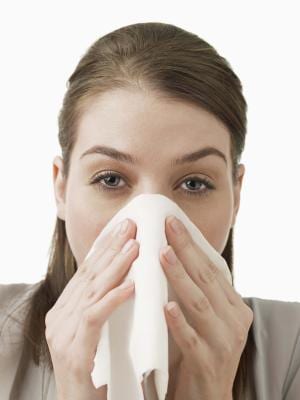Allergic reactions stem from a variety of causes, including environmental triggers, insect bites and food. Avoiding the trigger isn’t always an option, so over-the-counter allergy medications offer a form of relief. Consult with your health care provider if new allergy symptoms arise. Allergy testing and prescription medication might be options to consider.
Benefits
Over-the-counter allergy medications don’t cure your allergies, but they do calm the symptoms you experience. The medication counteracts the effects of the allergens to make you more comfortable. Depending on the type of medication you choose, relief might include a reduction in swelling, redness, watering eyes, congestion and mucus. The relief is only temporary if you remain exposed to the allergen. For example, if you are allergic to pollen, your symptoms will return once the allergy medicine wears off, because you are still exposed to the pollen that caused the reaction.
Types
Antihistamines, decongestants and combination drugs are the most common options for treating allergy symptoms. Histamine is released into your body when you come into contact with an allergen, causing symptoms like swelling, redness and itching. Antihistamine medications work against the histamine to prevent or reduce the symptoms. Decongestants reduce swelling in your nasal tissue and blood vessels that often accompany allergies. Combination drugs include both antihistamines and a decongestant to help with a broad range of allergy symptoms. Most allergy medications come in liquid and pills. Nasal sprays and eye drops are also available.
Side Effects
Most side effects of over-the-counter allergy medications are minor, but the potential for serious problems does exist. Contact your doctor if you experience strange or concerning side effects. Drowsiness is common with antihistamines. Nasal spray antihistamines can also cause nosebleeds, nasal discomfort, nausea, sneezing and sore throat, according to the Mayo Clinic. Decongestants have more potential side effects, including faster heartbeat, sleeping difficulties, headache, changes in blood pressure, dizziness and irritability.
Other Relief Options
Medication is only one option for over-the-counter allergy relief. Saline solutions available in nasal spray form offer a nonmedicated option. The spray helps break up mucus and congestion caused by allergies. It also moisturizes your nasal passages to prevent dryness. Nonmedicated eye drops are another option if your list of symptoms includes eye itching or redness.
Warning
If you have existing medical problems or are taking another medication, consult with your physician before taking an over-the-counter allergy medication. Drug interactions could cause a potentially serious reaction. Your physician has the best knowledge of your specific medical history to give you the safest option. Seek medical attention immediately if an allergic reaction causes shortness of breath or difficulty breathing.





